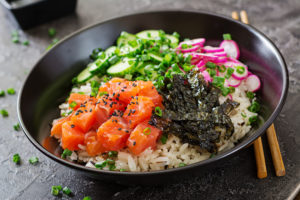Poke Gets Political

Like so many other culturally specific dishes, from pho to ramen to sushi, poke has made its way from the kitchens and restaurants of Pacific Islanders to mainland US cities like Los Angeles, New York, and Washington, DC. Poke is a traditional Hawaiian recipe consisting of different variations of diced raw fish, seaweed, spices, vegetables, condiments, and rice. There are a number of different versions of the dish hailing from the Hawaiian Islands, but any native islander would tell you that poke, in all its many forms, is a staple of traditional Hawaiian cuisine.
Several American-adapted poke chains have popped up in cities across the country, attracting hordes of people and making the CEOs of these chains ludicrously successful. But just like so many other American takes on ethnic commodities, the success of these chains are beginning to infringe upon the rights of the people who they first took the idea from.
Aloha Poke Co., one of these successful American poke chains, came under serious fire last year for attempting to trademark the word “aloha” (which is Hawaiian for “hello,” “goodbye,” and “love” and carries tremendous cultural significance for the indigenous people of Hawaii). Many have called the move a textbook definition of cultural appropriation. Native Hawaiian poke restaurant owners throughout Hawaii and the rest of the United States opened their mailboxes to find cease and desist letters threatening a lawsuit from Aloha Poke Co.’s litigators if they did not remove the word from their name and branding. Some of them, particularly the smaller businesses, felt they had no choice but to change their name for fear of being sued by a million-dollar company with hundreds of lawyers. Others, however, refused and continue to operate their businesses using “aloha” in their name and branding.
While former CEO and founder of Aloha Poke Co Zach Friedlander (a white, Chicago native) insists the public is misinformed, others are not convinced. The company’s proprietors assert that they aren’t trying to trademark the words “aloha” or “poke,” but that they are instead attempting to prohibit other poke restaurants (including those owned by Native Hawaiians or other Pacific Islanders) from using the phrase “Aloha Poke” only as they appear together, in their name and branding so the public would not mistakenly think these restaurants were related to Aloha Poke Co. However, one of the restaurants that received a cease and desist letter from Aloha Poke Co.’s litigators was called “Aloha Hawaiian Poke” and changed their name to avoid a lawsuit.
The gray areas in the entire situation is what many poke fans find to be both confusing and unsettling, a number of whom are outraged at the idea of a rich, American CEO bullying smaller, indigenous business-owners over the use of a word that carries such cultural significance. Many have stopped giving their business to the restaurant chain altogether, including DC native Miriam Tekie who used to frequent the Dupont Circle location before she heard of what the company was doing.
I just feel like they shouldn’t be doing that to people. How can you take something from somebody’s culture and then try and tell them they aren’t allowed to use it anymore? I don’t want to give money to a company like that and I don’t think I will until they resolve it.
The situation is still ongoing. If you’re a DC resident who loves poke but takes issue with supporting companies you believe to be oppressive, here are some great alternatives owned by native Asian/Pacific Islanders: Abunai Poke, Poke Papa, and Poki DC.
